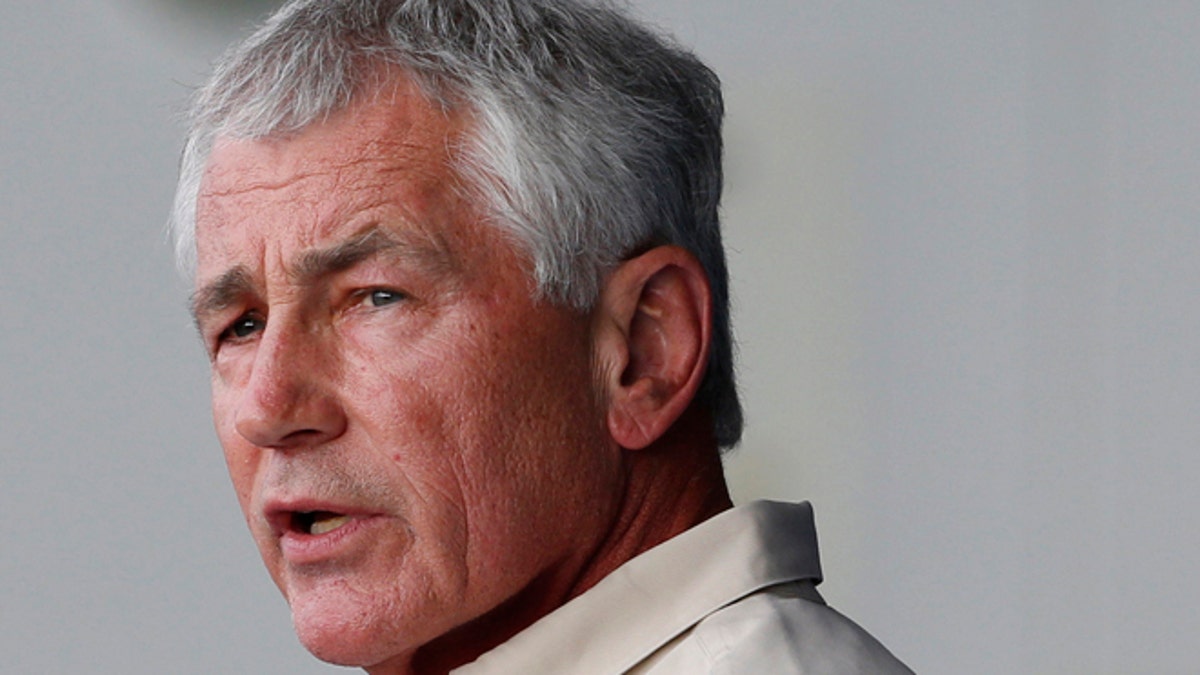
Oct. 10, 2014: Defense Secretary Chuck Hagel speaks at a new conference at the Tolemaida military base in Melgar, Colombia. (AP)
Defense Secretary Chuck Hagel on Monday described climate change as a national security threat -- at a time when the U.S. military is battling the Islamic State in the Mideast, responding to the Ebola crisis in West Africa, and monitoring tensions between Ukraine and Russia.
The Defense secretary addressed the issue during a speech in Peru, as the Pentagon released a comprehensive report on the "national security" challenges posed by rising global temperatures and "extreme weather events."
Hagel described climate change as a "threat multiplier," saying it "has the potential to exacerbate many of the challenges we already confront today -- from infectious disease to armed insurgencies -- and to produce new challenges in the future."
The Pentagon's new report maps out four areas of climate change deemed the most threatening to the U.S. military -- rising global temperatures, changing precipitation patterns, more extreme weather and rising sea levels. And it warns about the impact they could have on food and water supplies, the environment and American security itself.
"Our militaries' readiness could be tested, and our capabilities could be stressed," Hagel said, addressing a conference of military leaders.
Still, while the Pentagon and high-ranking officials have previously warned of the dangers of changing weather patterns and its side effects, the robust focus on the issue is raising questions at a time when the U.S. military is engaged in fighting the advancing Islamic State in Iraq and Syria.
Citing the Islamic State's recent gains, Sen. James Inhofe, R-Okla., said in a statement: "It is disappointing, but not surprising, that the president and his administration would focus on climate change when there are other, legitimate, threats in the world."
Inhofe is among the Republican lawmakers in Congress who downplay the impact of climate change, and argue the government is imposing too many changes and regulations to protect against it.
Hagel, and the Pentagon report, argued that changing weather patterns could spur more natural disasters, demanding more military support. More broadly, the report warns that as temperatures rise and severe weather increases, food, water and electricity shortages could create instability in many countries, spreading disease, causing mass migration and opening the door for extremists to take advantage of fractures in already-unstable countries.
Hagel delivered his report while on a six-day, three-country trip to South America, whose coastlines are often hit with violent earthquakes and other disasters.
"We have already seen these events unfold in other regions of the world, and there are worrying signs that climate change will create serious risks to stability in our own hemisphere," he said.
The Pentagon has been working for years to reduce the military's heavy footprint on the earth by using alternative fuels and conducting maintenance aimed at managing water use and encroachment on natural resources. The latest report, however, says the Pentagon has to better define how climate change could affect military operations, training, testing and readiness.
Hagel warned that receding ice in the Arctic may lead to a scramble for minerals and natural gas and oil reserves, a mad-dash that could potentially result in security issues for everyone.
Last November, at a security conference in Halifax, Nova Scotia, Hagel warned that the U.S. would assert its sovereignty in the Arctic, even as Russia, China and other countries stake their own claims in the largely untapped region. Increased use of the Arctic will require the U.S. to fill wide gaps in satellite and communications coverage, add deep-water ports and buy more ships that can withstand frigid waters or break through ice.
In addition to those costs, the U.S. will have to address other changes in military installations around the globe. Officials do not yet have cost estimates.
The Associated Press contributed to this report.
























